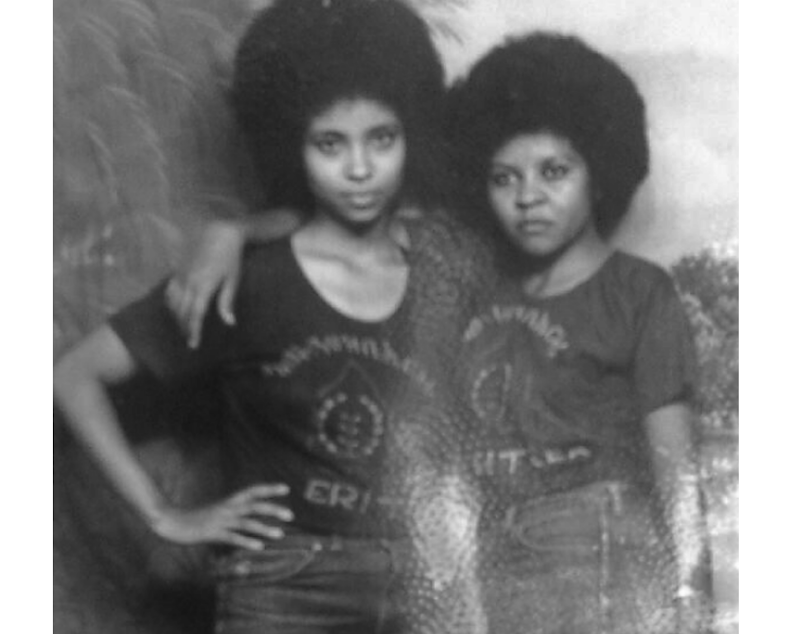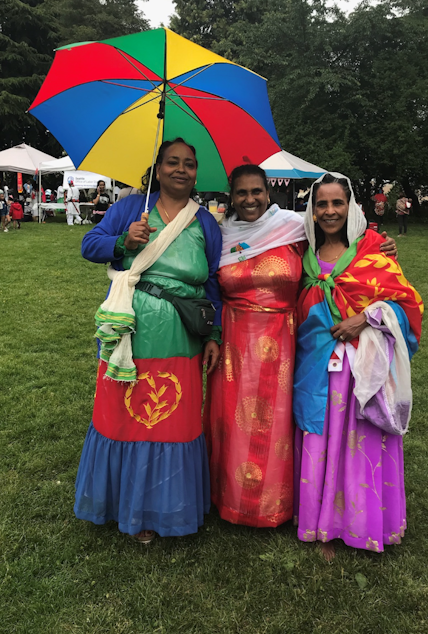My aunt was 16 when she ran off to join the Eritrean People's Liberation Front

T
he Eritrean War of Independence started in 1961 and lasted for 30 years, until the Eritrean People's Liberation Front defeated Ethiopian forces in 1991.
Nearly one-third of all soldiers in the Eritrean People's Liberation Front were women, including my relative, Akberet Asfaha.
Akberet is well-known throughout the Eritrean community in the Puget Sound area. She's funny and cheerful, and her confident and authoritative voice always seems to ring through the room.
I've always admired Akberet, but until recently, I didn't realize that she had fought in the Eritrean War of Liberation. She left home and joined the fight when she was just 16 years old — the same age I am now.
Akberet grew up in a small village in Eritrea called Adi Bezhanes. She went to school until the 8th grade, and after that, she stayed home. She prepared for the job many other girls in her village had: to be a housewife, like her mom and sister.
But her plans changed when the Eritrean War of Independence escalated. Eritrea was fighting to gain its independence from its neighboring country, Ethiopia.
After seeing what was happening, Akberet was motivated to fight.
Sponsored
"At first I'm scared," Akberet said. "Then I think, it's my decision. I have to go, I have to go."
So Akberet left home for the first time, without her parents' permission.
"It was hard, but I enjoyed it," she said. "I was active militarily and politically."
Eritrea had a small population, so the military needed women to become soldiers. They were able to drive tanks, use guns, and sometimes even become commanders.
Akberet told me that people are often surprised when they find out about her time in the field. "They say, do you know how to use a gun? I say yeah, and they are shocked."
Sponsored
The Eritreans had a small army, and soldiers faced many hardships, including extreme weather and limited food and supplies.
"I never forget," she said. "We fighting, we fighting. We don't eat for four days, except sugar and water.
"When I remember those days, I cry, because a lot of people, they pass away from that."
A
kberet told me stories about her closest friend in the army.
Sponsored
"Her name was Rosa," she said. "She was with me. They were coming. They kill her. I never forget that."
Later on, Akberet named her only daughter after Rosa, the friend she had lost.
In those harsh conditions, the women proved themselves to be equal to men.
The military's rules already stated that women soldiers were supposed to be treated no differently than their male counterparts. But Akberet told me this wasn't always the case.
"Some men," she said, "they look women down. But we fight, and we stand for our right. We got equal treatment."
Sponsored
Over time, they gained a lot of respect from male soldiers.
"Like brothers and sisters," she said. "They take care of me, I take care of them."
Akberet fought for two years and provided first aid assistance in the hospitals for five years. This helped her become the comfortable, courageous, and confident person I know today.
Akberet and her family moved to the United States in 1991 as refugees.
Today she lives in Lynnwood, and she makes sure to tell the women in her life about everything the women soldiers did for Eritrea.
Sponsored

She also helps organize the Eritrean Women's Day event in Seattle, held every year on March 8th.
"We talk about how we are equal to men," she told me. "We have music, get together, do our hair. Everything like a wedding. We celebrate."
During this day, people celebrate the many courageous women soldiers who helped them win the war.
I didn't even know about it until I made this story.
"You didn't know about it?" Akberet asked. "I'll remind you next year."
This story was created in KUOW's RadioActive Intro to Journalism Workshop for 15- to 18-year-olds at Jack Straw Cultural Center, with production support from Ann Kane. Edited by Jenny Asarnow.
Find RadioActive on Facebook, Twitter and Instagram, and on the RadioActive podcast.



